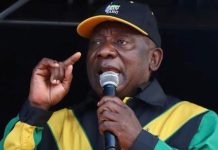Prinesha Naidoo and Antony Sguazzin
Africa-Press – South-Africa. Government incompetence, corruption and policy paralysis have left critical infrastructure in Africa’s most-industrialised nation in tatters, forcing companies to step into areas that are within the purview of the state in most countries, write Prinesha Naidoo and Antony Sguazzin.
On a recent sunny afternoon, Joshua Radebe patted down asphalt into a neatly filled pothole on a busy Johannesburg street as a motorist tooted and waved to him. Radebe works not for the government but for insurance company Discovery’s “Pothole Patrol”.
Like Discovery, which also pays for some of the fire engines in the South African commercial capital, precious metals producer Sibanye-Stillwater ensures that water near its mines is safe to drink and roads are maintained and well lit; it upgrades schools and clinics. Food producer Tiger Brands secures water supply for the town that’s home to its fruit-processing business, and Investec powers a traffic light near its offices during blackouts in Johannesburg. Glencore, Anglo American spinoff Thungela Resources and other owners of an export terminal spend about $1 million a month to protect trains transporting their coal from cable thieves.
“It’s not altruism,” said Lungisa Fuzile, chief executive officer of the South African unit of Standard Bank Group, the continent’s biggest lender. “You can’t run a successful private business in a sea of chaos.”
Government incompetence, corruption and policy paralysis have left critical infrastructure in Africa’s most-industrialised nation in tatters, forcing companies to step into areas that are within the purview of the state in most countries.
Power cuts of as many as 12 hours a day have driven schools, hospitals and businesses to generators. Water in some communities is unsafe to drink. A dilapidated sanitation system triggered a recent cholera outbreak near the capital, Pretoria. Outside of some national highways, paved streets have more potholes than road. Poorly maintained state schools are keeping a whole generation from access to a decent education. Theft of everything from copper cables to solar panels are common, and crime has soared to such an extent that the private security industry now employs more people than the police force and military put together.
“We are indeed, as many have said, running the risk of becoming a failed state because we’re already on borrowed time,” Daniel Mminele, chairman of Nedbank Grou and a former deputy central bank governor, said in April.
This isn’t how it was supposed to be. When the ANC came to power in South Africa in 1994, Nelson Mandela’s “Rainbow Nation” held out the promise of an efficient state-led economy that would uplift the downtrodden black majority. And for a while, it did.
But three decades on — while many ANC leaders still cling to that vision, referring to one another as “comrades” and trotting out the trope of “White Monopoly Capital” when they talk about business — the government’s role as a provider of basic services is virtually non-existent in large swaths of the country.
With an election next year and polls indicating that the ANC may lose its national majority for the first time, the party is leaning even more on the private sector to do the government’s job in a bid to stay in power. Business participation is being sought in electricity, rail and water against the wishes of some of the government’s biggest allies — labour unions.
Vincent Magwenya, spokesperson for President Cyril Ramaphosa, declined to comment except to say that the president is facilitating partnerships with the private sector to meet the needs of the economy. Mahlengi Bhengu, an ANC spokeswoman, didn’t respond to calls or messages seeking comment.
Government has failed SA
“The government has failed South Africans in terms of what it’s supposed to do, which is provide services for citizens,” said Thabi Leoka, an independent economist and member of Ramaphosa’s Economic Advisory Council. Businesses are unlikely to provide for those not directly linked to their operations, leaving many behind, she said.
The divide between rich and poor is widening in what is already the world’s most unequal nation, according to the Thomas Piketty-backed World Inequality Lab, turning South Africa into a tinderbox. There were 122 major protests cross the country in the first six months of this year over the failure of the government to deliver services like electricity and water, on course to beat the 2018 record of 237, according to data collated by Municipal IQ, which monitors the performance of the country’s municipalities.
“Protests have become increasingly violent and lawless,” said Kevin Allan, managing director of Municipal IQ. “The root cause is the exclusion of the protesters and their communities from services, political representation and economic opportunity.”
The inability of state-owned power utility Eskom — struggling with cable theft, corruption and old, poorly maintained coal-fired plants — to meet demand has prompted private companies to step in. They plan to build more than 10 gigawatts of capacity for their own electricity needs, freeing up power for others.
Inefficiencies at the country’s freight rail network and ports have forced the government to open them up to private participation. This week, state logistics company Transnet said it sold a stake in Durban Container Terminal Pier 2, part of Africa’s biggest harbor, to the Philippines’ International Container Terminal Services Inc.
The South African Post Office and South African Airways have collapsed. And although the flag carrier has restarted some flights, private couriers and airlines have largely stepped into the breach.
For More News And Analysis About South-Africa Follow Africa-Press






